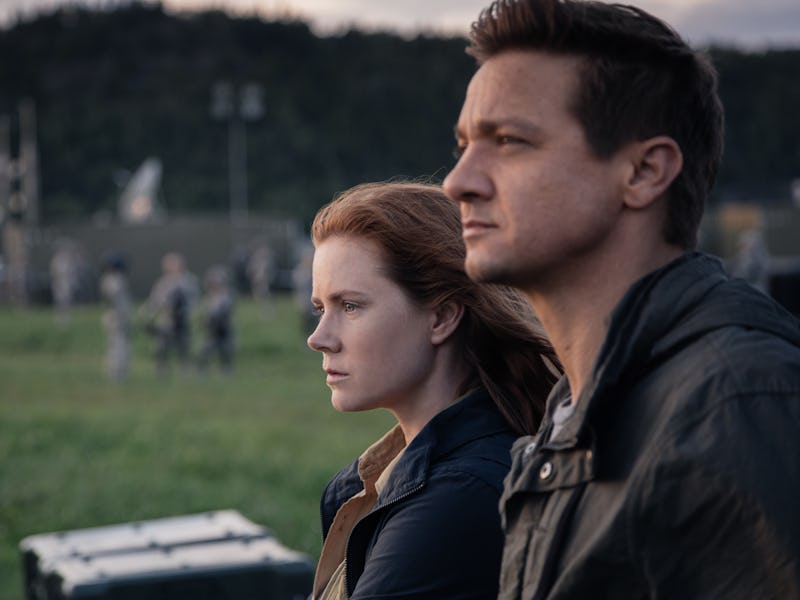Dune Is Denis Villeneuve’s Biggest Sci-Fi Movie, but It’s Not His Best
Villeneuve got his sci-fi start with this sensitive and cerebral masterpiece.

Like most of author Ted Chiang’s work, his 1998 novella “Story of Your Life” is as much an intellectual exercise as a narrative. It explores free will and the limits of communication via linguist Dr. Louise Banks, who attempts to learn the language of an alien species that’s arrived in Earth’s orbit. It also recounts the life of Louise’s daughter from Louise’s point of view, as she explores the past and the future simultaneously. Chiang mixes impressionistic snapshots from Louise’s experience as a mother with dense explorations of scientific principles.
There’s a lot more plot in Arrival, the 2016 film based on Chiang’s story, but screenwriter Eric Heisserer and director Denis Villeneuve maintain the essence of “Story of Your Life” while adding suspense, action, and more direct alien contact. Arrival never sacrifices Chiang’s big ideas or evocative emotions for blockbuster spectacle, which may be part of why it hasn’t had the same long-lasting pop-culture impact as Villeneuve’s subsequent sci-fi films Blade Runner 2049 and Dune, despite receiving eight Oscar nominations. It’s not a franchise starter or a brand extension. It’s a beautiful, touching, self-contained story.
Amy Adams gives one of her best performances as Louise, a university professor recruited by the gruff but understanding Colonel Weber (Forest Whitaker) to lead American efforts to communicate with aliens who’ve landed 12 vessels around the world. Louise travels to Montana with physicist Ian Donnelly (Jeremy Renner) to convene with the aliens aboard their ship. She discovers the seven-appendaged aliens, dubbed heptapods, use a written language unlike anything developed by humans, with intricate symbols that form full thoughts without corresponding to any spoken sounds.
As in Chiang’s story, Louise’s interactions with the heptapods are interspersed with scenes of her and her daughter, who will meet a tragic end at a young age. Heisserer and Villeneuve add more urgency to the aliens’ presence, depicting tensions among government officials. Chiang’s story is serene and contemplative, but in Arrival there’s the constant backdrop of chaos and civil unrest, shown in news broadcasts while Louise and Ian make their meticulous study of the heptapod language.
The heptapods use a written language unlike anything developed by humans.
The base camp in Montana looks like the military command center from dozens of other movies about aliens arriving on Earth, but this isn’t a place where generals and scientists are figuring out how to destroy the unknown. There is an eventual call for violence, but most of Arrival shows a remarkable level of human openness and cooperation, even in the face of global catastrophe. Tzi Ma plays a Chinese leader who pushes for an attack against the heptapods, but there are no real villains. As an invasion movie, Arrival champions the power of diplomacy.
Arrival is more intimate than an alien disaster movie like Independence Day or even the similarly sensitive Close Encounters of the Third Kind. Heisserer and Villeneuve expand the scope of Chiang’s story but keep the focus on Louise and her inner life, and how she’s personally changed by her time with the heptapods. Enhanced by Bradford Young’s moody, atmospheric cinematography and Jóhann Jóhannsson’s haunting, melancholy score, Arrival is an alien encounter by way of Terrence Malick’s The Tree of Life. Malick looked at the entire history of the universe through the lens of one Texas family, and Villeneuve similarly anchors this intergalactic event in Louise’s perspective.
Louise attempts to communicate with the heptapods.
Adams makes that perspective every bit as fascinating as the extraterrestrial visitation, giving Louise a sense of determination and vulnerability. She makes Louise’s explanations of the power of language something vital and profound, and she does the same for Louise’s quiet interplay with her daughter. It’s all part of the same continuum, the breadth of human experience that the heptapods can highlight by provoking a sort of gentle existential crisis.
Louise’s heptapod project and her personal life come together in an elegant yet mind-blowing twist in the movie’s climax. Chiang eases into that final revelation, but Heisserer and Villeneuve make it a bombshell while retaining its emotional power. It’s telling that Arrival ends not on aliens or spaceships, but on a tender moment between two people who love each other.
That focus on the human element in dense, heady sci-fi stories has served Villeneuve well, as he kept the vast worlds of Blade Runner 2049 and Dune grounded with the desires and relationships of its heroes. Even the tactile approach to special effects, with a weight and presence often missing from modern CGI, has carried over from Arrival to Villeneuve’s franchise films. It’s the ideal starting point before you branch out into his wider universes.
Arrival is streaming on Amazon Prime Video.